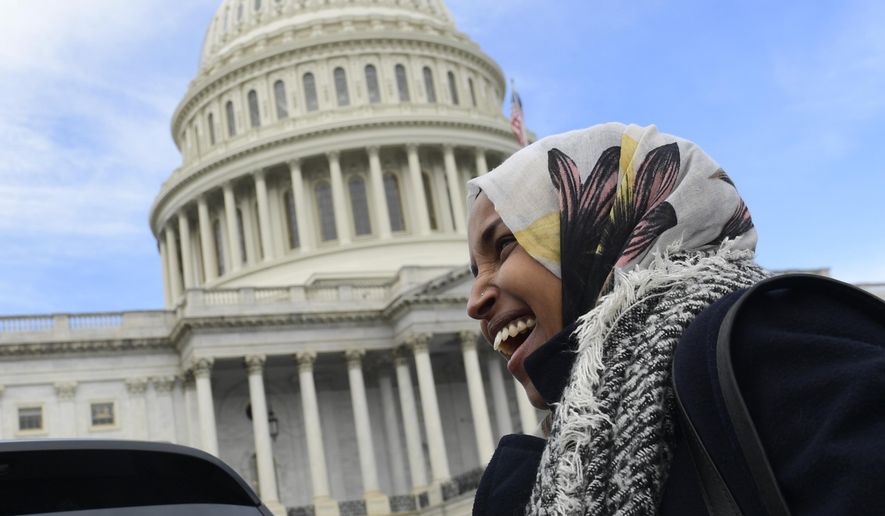The House imposed a rule in the mid-1800s requiring members to remain “uncovered” while the chamber was in session, effectively barring them from wearing a hat in the august body.
Two centuries on, Democrats say it’s time to carve out an exception for one of their new members, Ilhan Omar of Minnesota, who was elected this month and will be the first member of Congress to wear a hijab, a traditional covering worn in public by some Muslim women.
Incoming House Rules Committee Chairman Jim McGovern of Massachusetts says it’s time for a religious exemption to the rule.
“This change will finally codify that no restriction may be placed on a member’s ability to do the job they were elected to do simply because of their faith,” Mr. McGovern said. “The American people just elected the most diverse Congress in history and our rules should embody that.”
He has the support of House Minority Leader Nancy Pelosi, who is running for speaker and has touted the increasing diversity of a Democratic caucus that will retake the majority for the first time in eight years.
“Democrats know that our strength lies in our diversity, regardless of race, gender, sexual orientation or religion,” Mrs. Pelosi said. “After voters elected the most diverse Congress in history, clarifying the antiquated rule banning headwear will further show the remarkable progress we have made as a nation. We are committed to ensuring that the People’s House truly reflects the beautiful diversity of the American people whom it is our great honor to serve.”
Ms. Omar, who won 78 percent of the vote on Election Day, and Rep.-elect Rashida Tlaib of Michigan will be the first Muslim women to serve in Congress when it reconvenes in January.
House Democrats are unaware of any opposition to the proposed changes on head coverings so far, a Democratic aide said, though the rules changes are still in discussion form, so further details of the broad package must be drawn in.
In the Senate, men are prohibited from wearing hats, but the rules are looser for women.
Becket, a nonprofit that defends religious liberty, said the change is a “no brainer.”
“Just as we don’t allow religious tests for public office, we don’t bar someone from public office because of her religious clothing,” said Luke Goodrich, vice president and senior counsel at Becket.
The House first debated head coverings in 1822, when Rep. Charles F. Mercer of Virginia tried — and failed — to pass a rule that would ban members from remaining “covered” while the chamber was in session, according to House’s historical website.
Lawmakers continued to wrangle over the question in the late 1820s and early 1830s. At one point, Rep. Lewis Williams raised a practical objection — if members didn’t wear their hats on their heads, they would have no place to put them, since the old chambers didn’t have a cloakroom. Others said refusing to wear a hat was a great way to differentiate themselves from the king of England and his famous headgear.
Eventually, the hat critics won in 1837 in what the House website calls an “anticlimactic” vote to impose the new rules.
One of the most recent lawmakers to run afoul of the rule was Rep. Bobby Rush, who in 2012 took to the well of the House to recite Bible verses and don a hooded sweatshirt while decrying the death of Florida teen Trayvon Martin.
“Members need to remove their hoods or leave,” said Rep. Gregg Harper, a Republican overseeing the chamber at the time, banging the speaker’s gavel to punctuate his admonitions.
Ms. Omar, a Somali American, is replacing Rep. Keith Ellison, who was the first Muslim elected to Congress in 2007.
She vowed on social media to defend her choice of headwear and alluded to a future fight, presumably against President Trump’s travel ban on people from certain predominately Muslim countries.
“No one puts a scarf on my head but me. It’s my choice — one protected by the First Amendment,” she tweeted over the weekend. “And this is not the last ban I’m going to work to lift.”
The Council on American-Islamic Relations (CAIR), the nation’s largest Muslim civil rights group, threw its support Monday behind Democrats’ rules change.
“Islamic head coverings, Sikh turbans, Jewish yarmulkes, and Mennonite bonnets are all expressions of religious belief and are therefore already protected by the First Amendment to the Constitution, which states that ’Congress shall make no law respecting an establishment of religion, or prohibiting the free exercise thereof,’” said CAIR National Executive Director Nihad Awad.
The broader ban on non-religious head coverings appears poised to remain.
Rep. Frederica Wilson, a Florida Democrat known for her colorful, often-bedazzled hats, told The Miami Herald in 2010 that the rule was “sexist,” arguing that women wear hats indoors.
A Wilson spokeswoman, Joyce Jones, said late Monday the congresswoman “does not plan to raise the issue of her signature hats” this time around.
The proposed rules change is just one of those likely to be part of the package House Democrats will offer in the new Congress. Other changes cover how long members should get a chance to review legislation before voting on it.
The package also would reinstitute the “Gephardt rule,” named for former Rep. Richard Gephardt, which assumes the debt ceiling is raised after Congress votes to pass a budget resolution.
The idea is to avoid the messy fights over raising the debt ceiling that have rattled the markets in recent years.
Mrs. Pelosi and other lawmakers, including the Progressive Caucus, also want to establish a permanent House Diversity Initiative that encourages offices to interview minorities for senior staff positions.
• Tom Howell Jr. can be reached at thowell@washingtontimes.com.




Please read our comment policy before commenting.